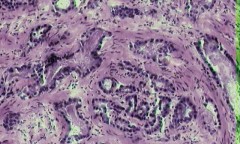By Vishal Goel, | January 16, 2017

The research led by the Wellcome Trust Sanger Institute discovered a new biological target for drugs to reduce the spread of tumors in cancer patients. (Rama/CC BY-SA 2.0 FR)
According to a study in the UK, the spread of cancer-causing tumors can be cut by as much as 75 percent by altering the immune system. Using genetically modified mice for the experiment, scientists identified a total of 23 genes involved in regulating the spread of cancers. Targeting one of these genes, called Spns2, led to a three-quarter reduction in the spread of the tumor.
Like Us on Facebook
The research led by the Wellcome Trust Sanger Institute discovered a new biological target for drugs to reduce the spread of tumors in cancer patients. The study, which has been published in Nature, found 23 genes that are involved in regulating the spread of cancers. The researchers showed that targeting one of these genes - Spns2 - led to a three-quarters reduction in tumor spread.
The spread of tumors, called metastasis, to other parts of the body is the leading cause of death among cancer patients, causing up to 90 percent of fatalities.
The Experiment
To spot the genes that influence metastasis, the researchers looked at how tumors spread in genetically engineered mice that were missing specific single genes. After screening about 810 unique genes, the researchers were able to identify 23 genes that either increased or decreased the spread of skin tumor cells to the lungs. Removal of the Spns2 gene not only reduced the spread of tumors to the lungs by approximately four times, but also reduced the metastasis of cancers that spread from the colon, lung, and breast.
Dr. David Adams from the Wellcome Trust Sanger Institute said that the loss of the Spns2 gene causes the greatest reduction in the formation of tumor colonies and thus has become a novel therapeutic target.
Mice lacking the Spns2 gene have a different ratio of immune system cells than normal mice. Thus, drugs targeting this gene could help reduce or prevent the spread of tumors in the body, Adams added.
-
Use of Coronavirus Pandemic Drones Raises Privacy Concerns: Drones Spread Fear, Local Officials Say

-
Coronavirus Hampers The Delivery Of Lockheed Martin F-35 Stealth Fighters For 2020

-
Instagram Speeds Up Plans to Add Account Memorialization Feature Due to COVID-19 Deaths

-
NASA: Perseverance Plans to Bring 'Mars Rock' to Earth in 2031

-
600 Dead And 3,000 In The Hospital as Iranians Believed Drinking High-Concentrations of Alcohol Can Cure The Coronavirus

-
600 Dead And 3,000 In The Hospital as Iranians Believed Drinking High-Concentrations of Alcohol Can Cure The Coronavirus

-
COVID-19: Doctors, Nurses Use Virtual Reality to Learn New Skills in Treating Coronavirus Patients











